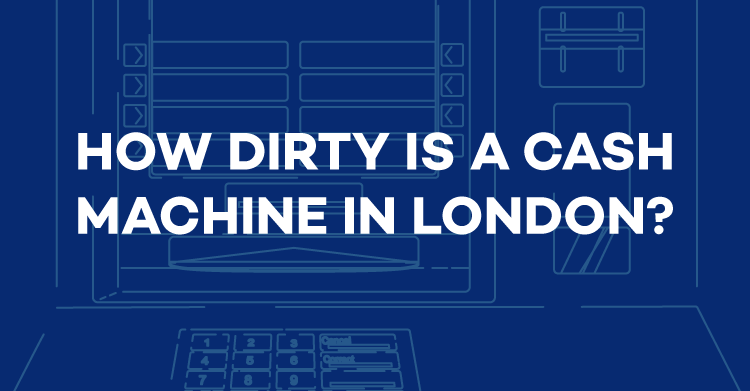You’re in a crowded street in London, you’ve just found the perfect gift for the birthday party you’re running late for, and, of course, the shop only takes cash. You dash over to the nearest cash machine to get out some money – grab the cash and rush back to the store.
While all this was happening the last thing on your mind was probably the number of germs you just encountered. But any surface that is regularly used by people will be host to a variety of bacteria. The question is, does it matter? Should you be worried about germs when getting money out of a ‘hole-in-the-wall’?
We decided to investigate this and find out ‘how dirty is a cash machine in London?’
Finding out how dirty a cash machine is would be useless without something to compare it to. So, as well as researching how dirty a typical cash machine in London is, we also looked into how it compares to other objects you might touch on a daily basis, as well as what you can do about the germs you encounter, and most importantly what you should do with all this info.
To conduct this study we looked at cash machines from various boroughs all over London. We swabbed each cash machine and then placed the cotton swab in an RLU reader (the SystemSURE Plus). An RLU reader is a device that uses measurements of light to test for adenosine triphosphate (ATP), a chemical that bacteria use to process energy. The SystemSURE Plus returns an RLU (relative light unit) score, with 10 RLU being a safe limit for dining or operating room surfaces. By swabbing the keypad, touchscreen, and card reader we were able to determine which parts of the average cash machine were the dirtiest.
Then, just for comparison’s sake, we did the same thing to various objects around the city that you might encounter on a typical commute.
Here are the parts of a cash machine to avoid
The good news here is, not all parts of a cash machine are equally dirty. In fact, the cash dispenser was relatively clean – that is, compared to the average keypad on a cash machine, which was the dirtiest part. The next dirtiest part was the touchscreen (or buttons) and then the card reader.
Of course, as we discovered in our research, not all bacteria is something we need to worry about – in fact, some bacteria can even protect us from disease by attacking harmful pathogens. Unfortunately, there’s no way for you to tell just what sorts of bacteria are on that cash machine you’re about to touch, so it’s best to play it safe to avoid possible sickness.
When taking out cash, touch the machine as little as possible. When you’re finished, wash your hands with hot water and soap at your next convenience and be mindful not to touch your face before you do.
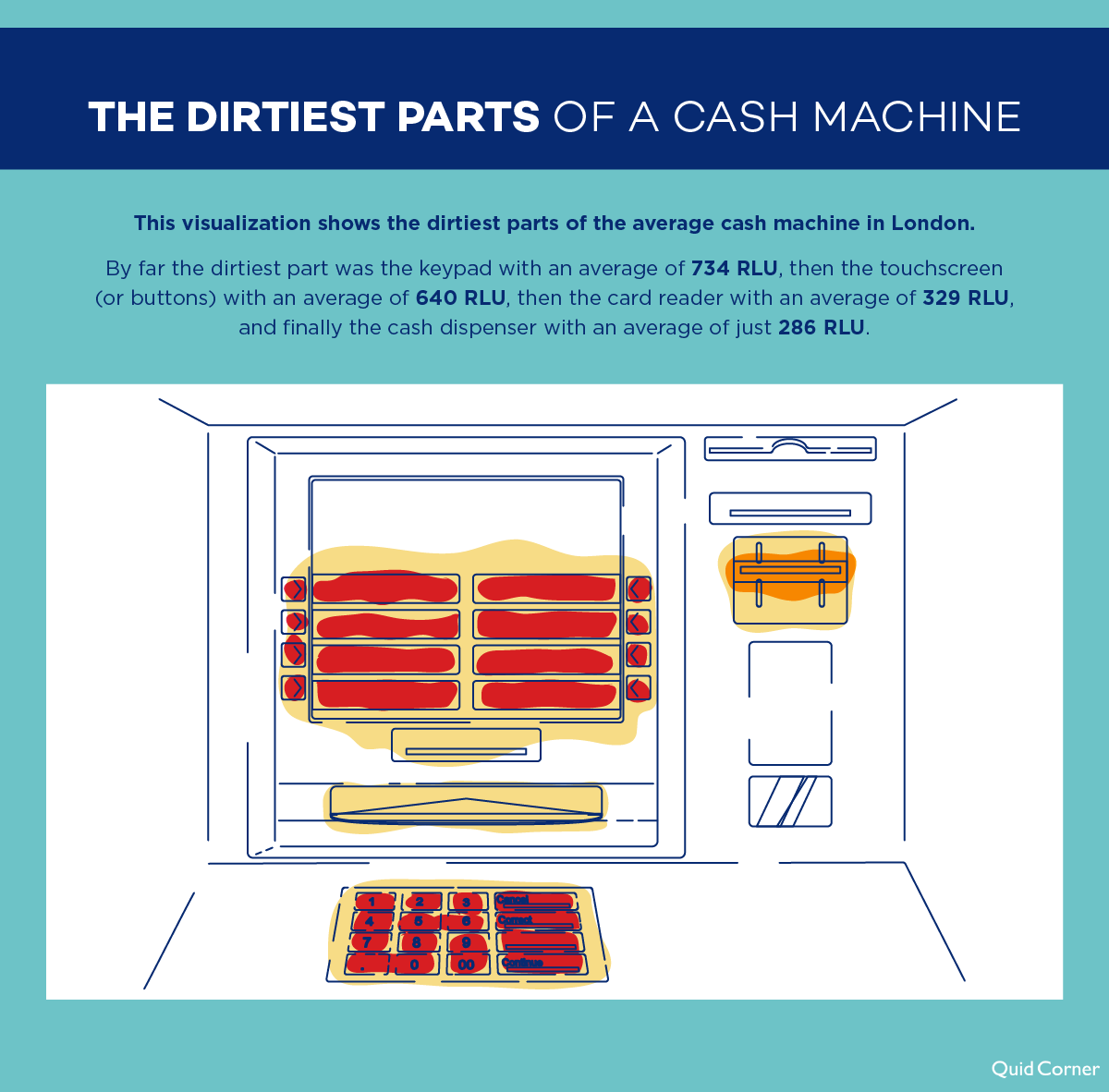
Are cash machines particularly filthy or is everything dirty?
At this point you might be thinking I’ll never touch another cash machine again! But as we found in our research, cash machines are not the dirtiest thing out there; they’re not even the dirtiest thing you probably touch on a regular basis. In this visualisation you’ll see how the average cash machine compares to several other objects. We chose these objects because they’re things you’ll come across on a typical commute across London.
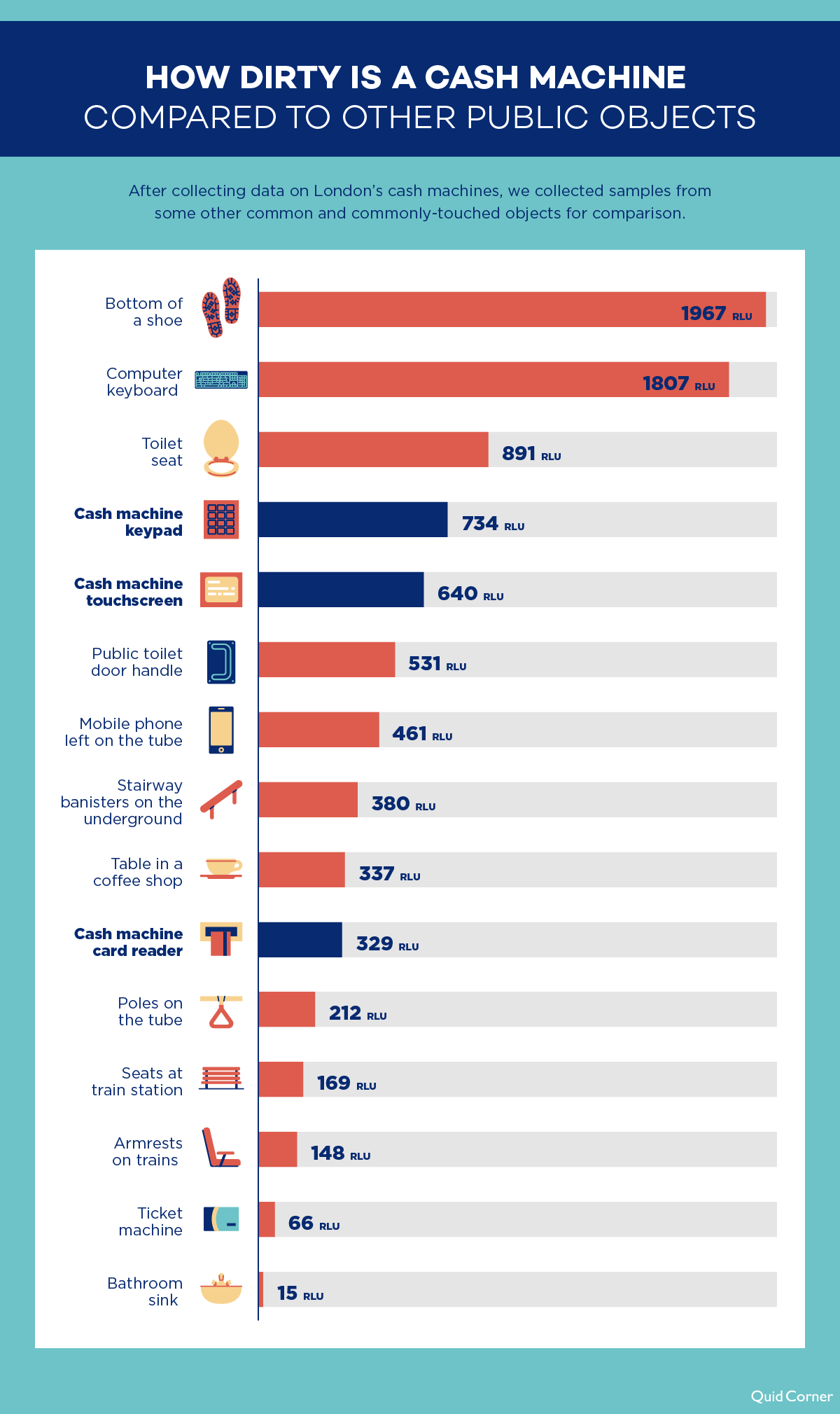
London’s dirtiest and cleanest cash machines
Midway between a school, a college, a tube station, Queens Park Rangers’ football stadium, and the Empire gig venue, the cash point at 420 Uxbridge Road in Shepherd’s Bush is the filthiest machine we found in London. Its keyboard had an RLU score of 1232, more than 120 times the ‘safe limit’. But of all the areas we surveyed, Piccadilly Circus at the heart of London’s West End was the most consistently dirty (averaging out 3 cash machines in each area). As a busy meeting place and tourism hub, perhaps it is the pure weight of human traffic that brings all that bacteria.
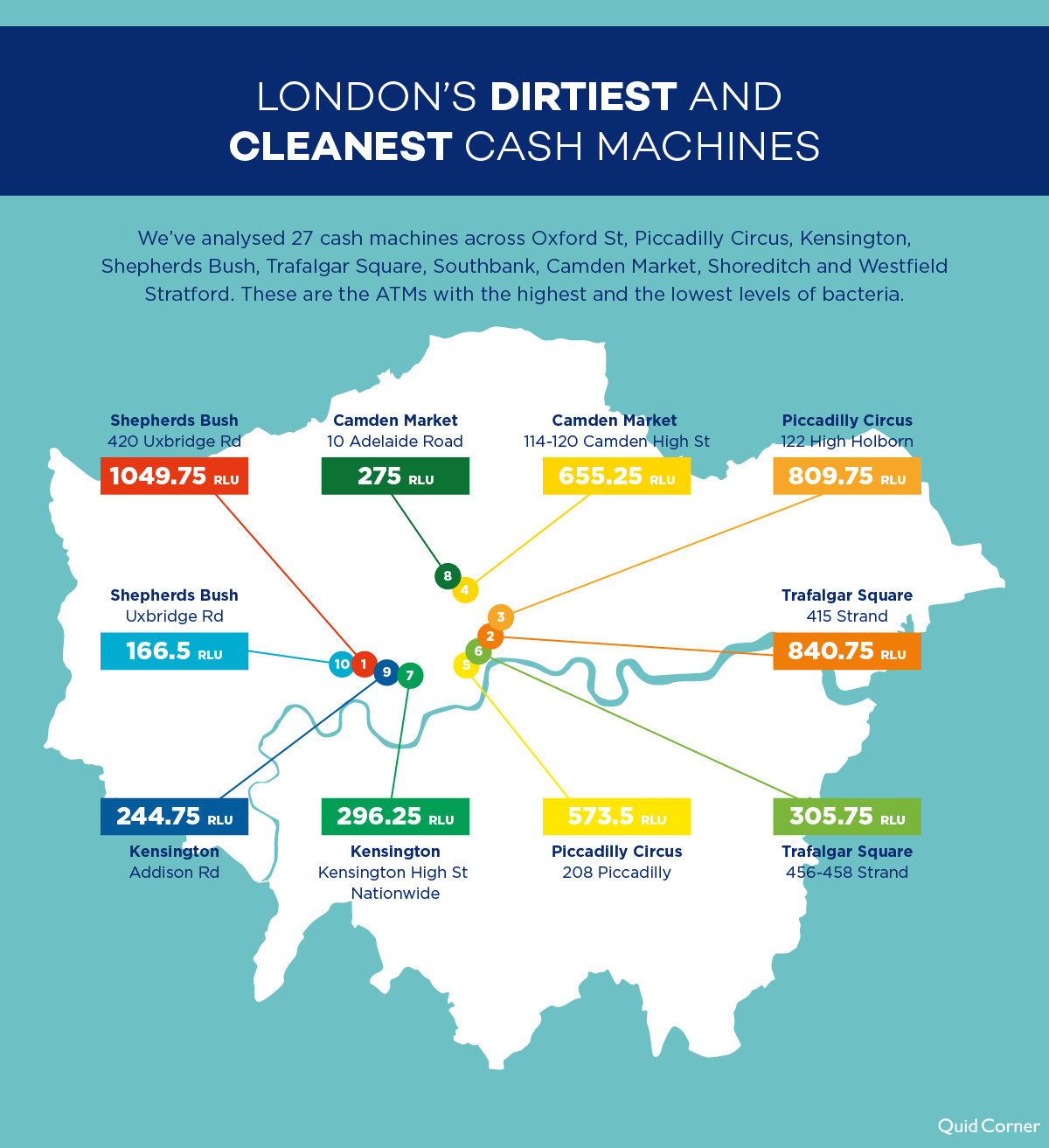
Comparing all 27 cash machines against each other
From the surprisingly clean machine outside bustling Camden Market to the super-grubby ATM outside Uxbridge Road’s Post Office, here are all the machines we tested. In most areas, you should be able to find a machine that is distinctly cleaner than the others, although in Shoreditch and Westfield Stratford City we found that the machines were as moderately dirty as each other.
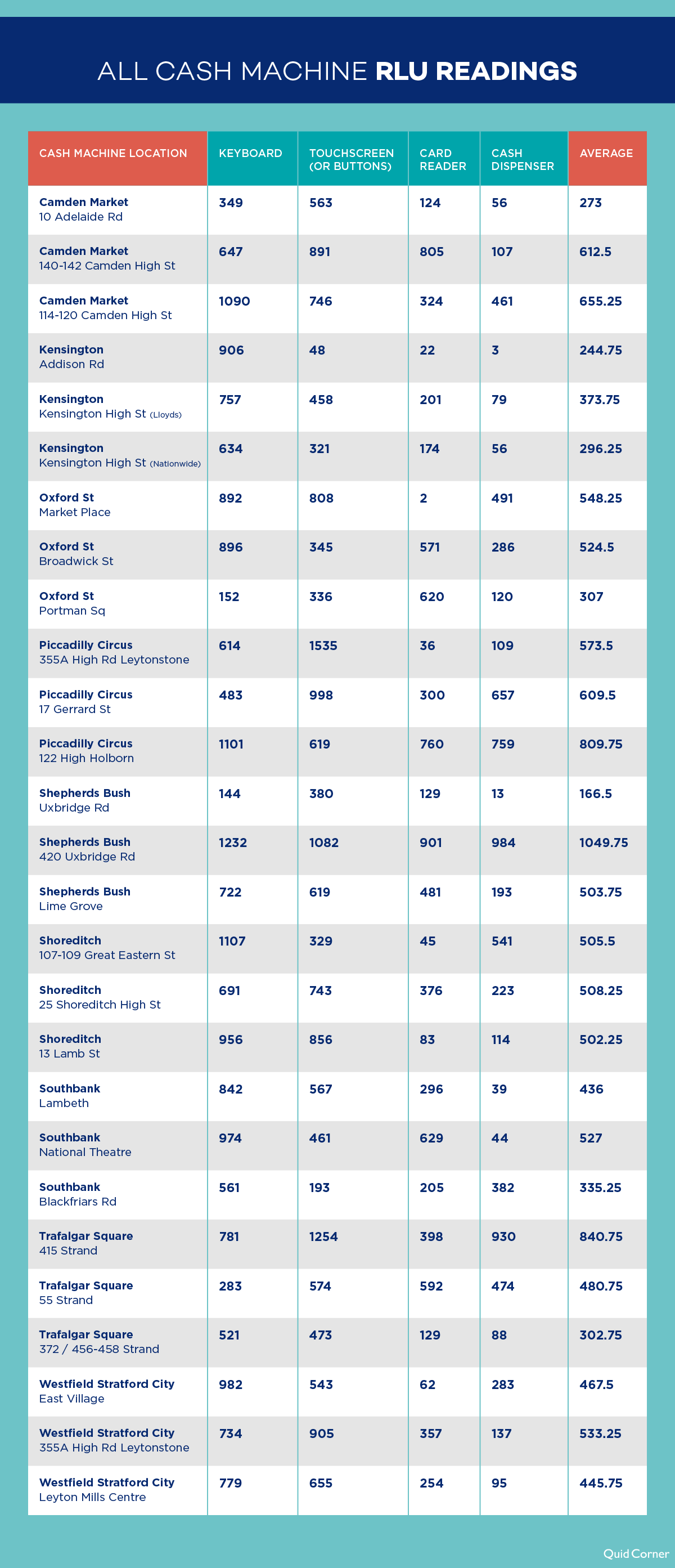
What should you do about a dirty cash machine?
Before you wrap yourself in plastic and commit to never leaving home again, please review the tips below. Because, yes, there are germs and bacteria on the average cash machine – not to mention, the bottom of your shoe – but it’s not anything you need to really worry about. In fact, as you’ll see here, germs are actually quite necessary to our overall health and wellbeing.
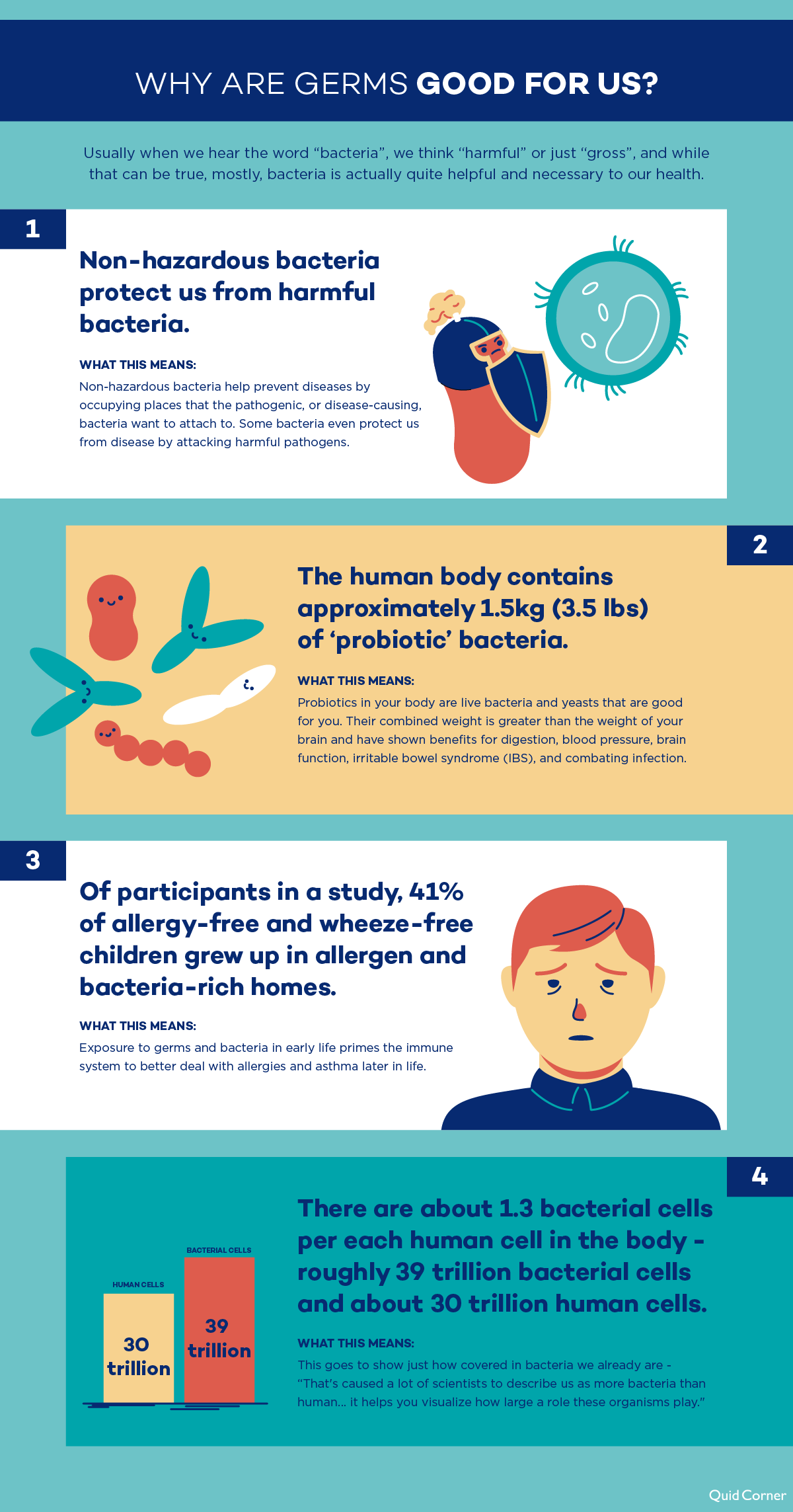
And while we absolutely need certain germs to live healthily, there are also some easy steps you can take in your daily life to help limit the spread of harmful germs: washing your hands in hot, soapy water, for example. Avoid touching your face. And, you can start drying your hands with a paper towel rather than the hot air dryers in public bathrooms.
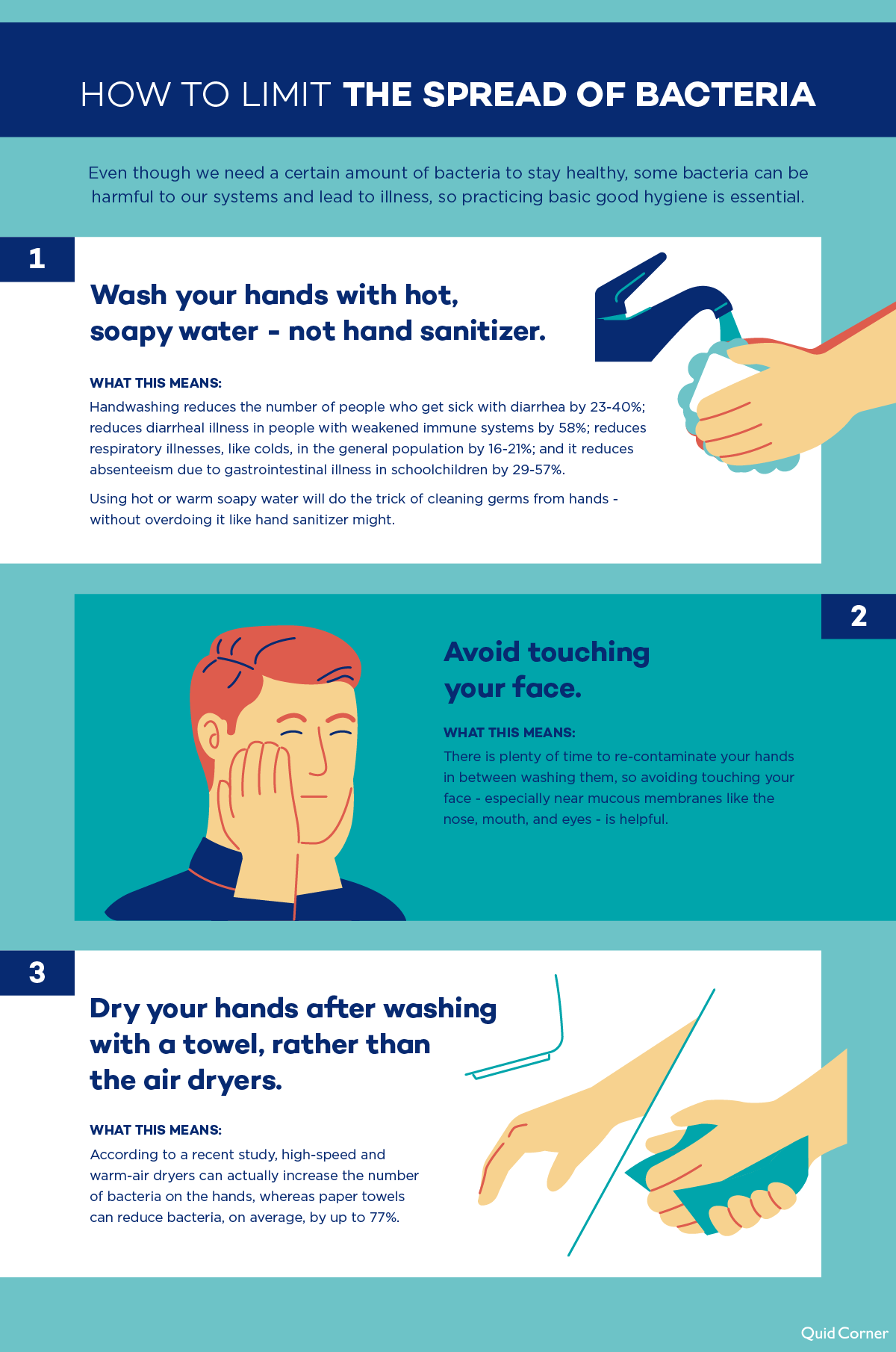
Methodology
So how exactly did we go about our research? First, we used Google Maps to find various cash machines in some of the busiest, most heavily-trafficked areas of London. We chose 27 cash machine locations that were dispersed throughout the city – not just in the city center. Then, we sent two researchers to each of the 27 cash machines with an RLU reader. An RLU reader is a device that uses Relative Light Units to measure the amount of dirt / bacteria on a surface. We swabbed the keyboard, the touchscreen (or buttons), the card reader, and the cash dispenser. Placing these swabs into the RLU reader gave us a number. The higher the number the more dirt / bacteria there is on a surface. We then averaged the numbers in each category to determine which parts of the average cash machine in London were dirtiest and which were cleanest.
We then repeated this process with various objects and surfaces we decided might be touched on a typical London commute – from the bottom of a shoe to the bathroom sink. With our RLU reader results, we were able to compare the cleanliness (or lack thereof) of London’s cash machines and various other surfaces around the city.
Finally, we did some digging into germs themselves. Using information provided by the World Health Organisation, The NHS and the US Centers for Disease Control and Prevention we researched just how common germs are and how important they are to our health, and also, simple ways we can prevent the spread of germs that may be harmful.

